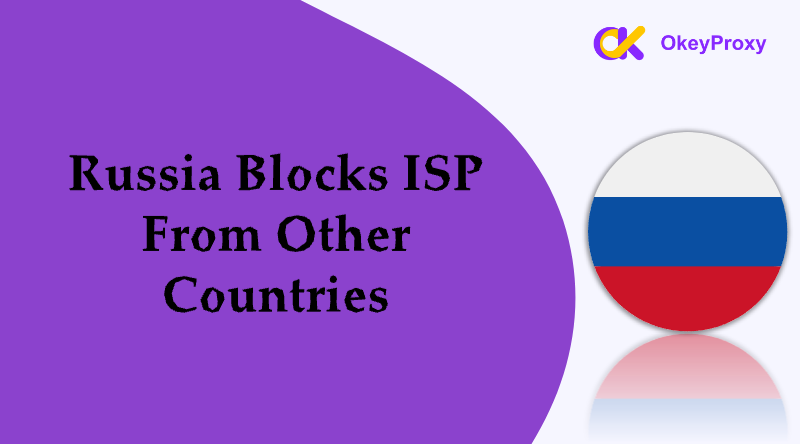Che cos'è l'ISP?
Un Internet Service Provider (ISP) è un'azienda o un'organizzazione che fornisce a privati e aziende l'accesso a Internet. Gli ISP forniscono connettività attraverso varie tecnologie, come cavi in fibra ottica, DSL, cavo, satellite o reti wireless. Oltre all'accesso a Internet, molti ISP offrono servizi correlati come l'hosting di e-mail, l'hosting web e la registrazione di domini. Esempi di ISP sono Comcast, AT&T e Verizon negli Stati Uniti, o BT e Vodafone in Europa. Gli ISP assegnano gli indirizzi IP ai loro utenti, gestiscono il traffico dati e spesso impongono limiti di banda o di utilizzo in base ai loro piani di servizio.Perché la Russia blocca gli ISP stranieri?
La decisione di bloccare gli ISP provenienti dall'esterno della Russia fa parte di un più ampio sforzo del governo russo per rafforzare il controllo sull'uso di Internet all'interno dei suoi confini. Questa politica si allinea con la politica russa di "Internet sovrano" che mira a creare un'infrastruttura Internet autosufficiente. Ecco alcune delle ragioni principali alla base di questa iniziativa:- Problemi di sicurezza nazionale: Per evitare la sorveglianza straniera o i cyberattacchi, il governo russo cerca di ridurre al minimo la dipendenza dalle reti straniere.
- Controllo delle informazioni: Bloccare gli ISP stranieri aiuta a regolare il flusso di informazioni e a limitare l'accesso ai contenuti ritenuti sfavorevoli dal governo.
- Interessi economici: Incoraggiare l'uso di ISP locali sostiene le imprese russe e riduce la dipendenza dalle aziende internazionali.
- Tensioni geopolitiche: Le crescenti tensioni con altre nazioni hanno spinto a regolamentare in modo più severo Internet come forma di sovranità digitale.
Che impatto ha questo blocco sugli utenti?
Il blocco degli ISP stranieri ha implicazioni diffuse per gli individui, le imprese e l'ecosistema globale di Internet.- Accesso limitato ai contenuti globali: Gli utenti russi sono soggetti a restrizioni nell'accesso a siti web, app e servizi internazionali.
- Sfide per le imprese: Le aziende che si affidano a piattaforme internazionali per la comunicazione o le operazioni possono avere difficoltà a mantenere flussi di lavoro fluidi.
- Aumento della censura: Un maggiore controllo sugli ISP significa che il governo può bloccare più facilmente i siti web, censurare i contenuti e tracciare le attività degli utenti.
- Costi più elevati: Con un numero inferiore di opzioni per gli ISP, gli utenti potrebbero trovarsi di fronte a prezzi più alti e velocità di Internet più basse.
- Impatto sulle imprese straniere: Le aziende che forniscono servizi in Russia potrebbero subire una riduzione del traffico e dell'impegno a causa delle restrizioni di accesso.
Per gli utenti colpiti dai blocchi degli ISP, ci sono alcuni modi per mantenere l'accesso ai contenuti globali e garantire la privacy online:
- Utilizzare un server proxy: I proxy fungono da intermediari, consentendo agli utenti di aggirare le restrizioni geografiche e di accedere ai contenuti degli ISP bloccati. Per avere dei proxy affidabili e sicuri, prendete in considerazione servizi come OkeyProxyche offrono connessioni anonime e ad alta velocità.
- Provate una rete privata virtuale (VPN): Una VPN cripta la vostra connessione e la instrada attraverso server in altri paesi, aggirando le restrizioni locali. (Nota: alcuni Paesi, tra cui la Russia, hanno vietato alcune VPN, quindi scegliete con attenzione).
- Optate per alternative locali: Cercate servizi locali che offrano funzionalità simili alle piattaforme internazionali bloccate.
- Rimanete aggiornati: Seguite le notizie sulle politiche internet nella vostra regione per anticipare i cambiamenti e adattarvi di conseguenza.
Fornitore di proxy ISP supportato dalla Russia
Quando si tratta di trovare proxy ISP affidabili che supportino gli indirizzi IP russi, OkeyProxy si distingue come fornitore affidabile. Offrendo proxy di alta qualità, adatti a diversi casi d'uso, OkeyProxy si rivolge alle aziende e ai privati che necessitano di connessioni stabili e veloci con indirizzi IP russi.Cosa sono i proxy ISP?
I proxy ISP, noti anche come deleghe residenziali statichecombinano l'alta velocità dei proxy dei centri dati con l'autenticità dei proxy residenziali. Questi proxy utilizzano indirizzi IP registrati presso Internet Service Provider (ISP) legittimi, il che li rende ideali per le attività che richiedono un elevato anonimato e affidabilità, come ad esempio:- Web scraping: Raccogliere dati da siti web russi senza essere bloccati.
- Monitoraggio del commercio elettronico: Analizzare i prezzi o l'inventario dei concorrenti sulle piattaforme di e-commerce russe.
- Gestione dei social media: Gestire più account su piattaforme che richiedono indirizzi IP russi.
- Monitoraggio SEO: Monitoraggio delle classifiche dei motori di ricerca e del traffico specifico per il mercato russo.
Perché scegliere OkeyProxy per i proxy ISP russi?

-
Connessioni ad alta velocità
OkeyProxy offre proxy ISP ottimizzati per la velocità, garantendo bassa latenza e prestazioni affidabili. Questo è fondamentale per le attività che richiedono dati in tempo reale o per la gestione continua degli account. -
IP residenziali statici
Con gli indirizzi IP statici, gli utenti possono mantenere sessioni costanti, il che è ideale per progetti a lungo termine come la verifica degli annunci o l'automazione degli account mirati a domini russi. -
Ampio pool di IP russi
OkeyProxy gestisce un vasto pool di indirizzi IP russi, offrendo diverse opzioni per soddisfare esigenze specifiche. -
Anonimato eccezionale
I proxy ISP di OkeyProxy offrono un elevato anonimato, che li rende resistenti al rilevamento e ai divieti, anche su piattaforme con misure anti-proxy rigorose. -
Piani tariffari flessibili
Piani tariffari convenienti e personalizzabili consentono agli utenti di scegliere pacchetti adatti alle loro esigenze di utilizzo, sia per uso personale che per operazioni aziendali su larga scala.
Utilizzo OkeyProxyI proxy ISP russi sono semplici da usare. Il servizio offre una facile integrazione con gli strumenti e le piattaforme più diffuse. OkeyProxy supporta una vasta gamma di protocolli, tra cui CALZATURE5, garantendo la compatibilità con le diverse applicazioni.

